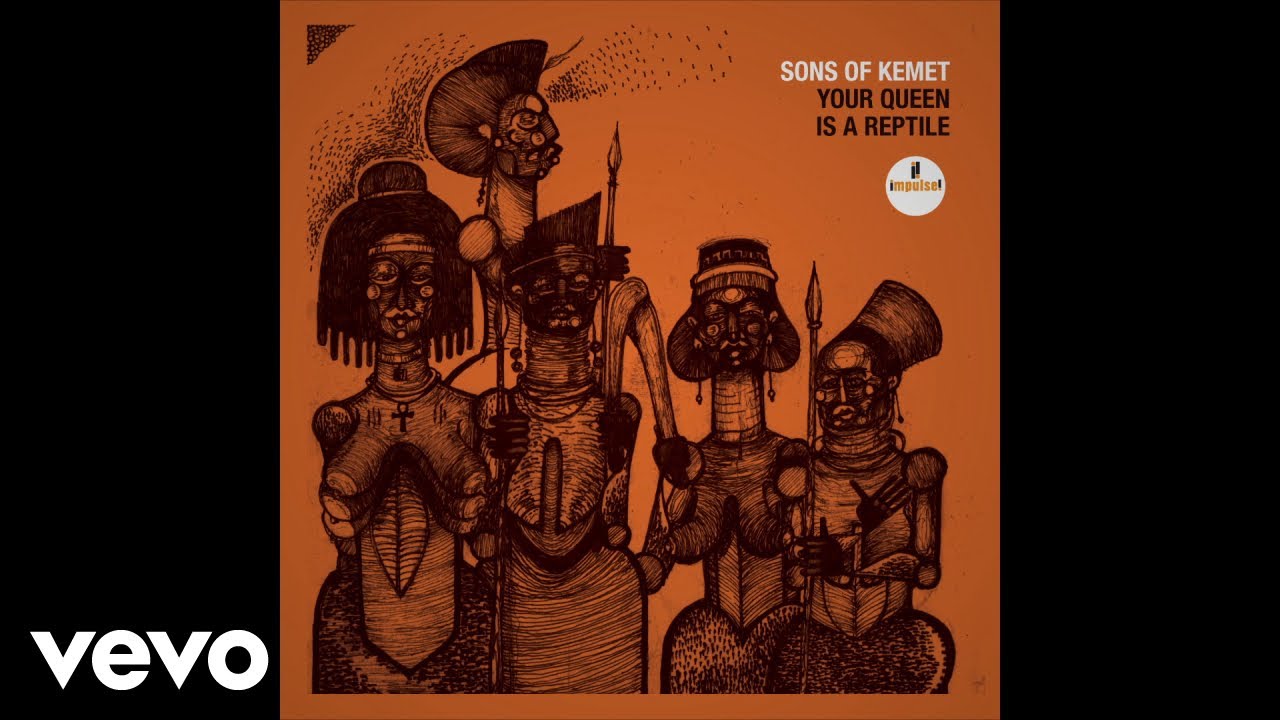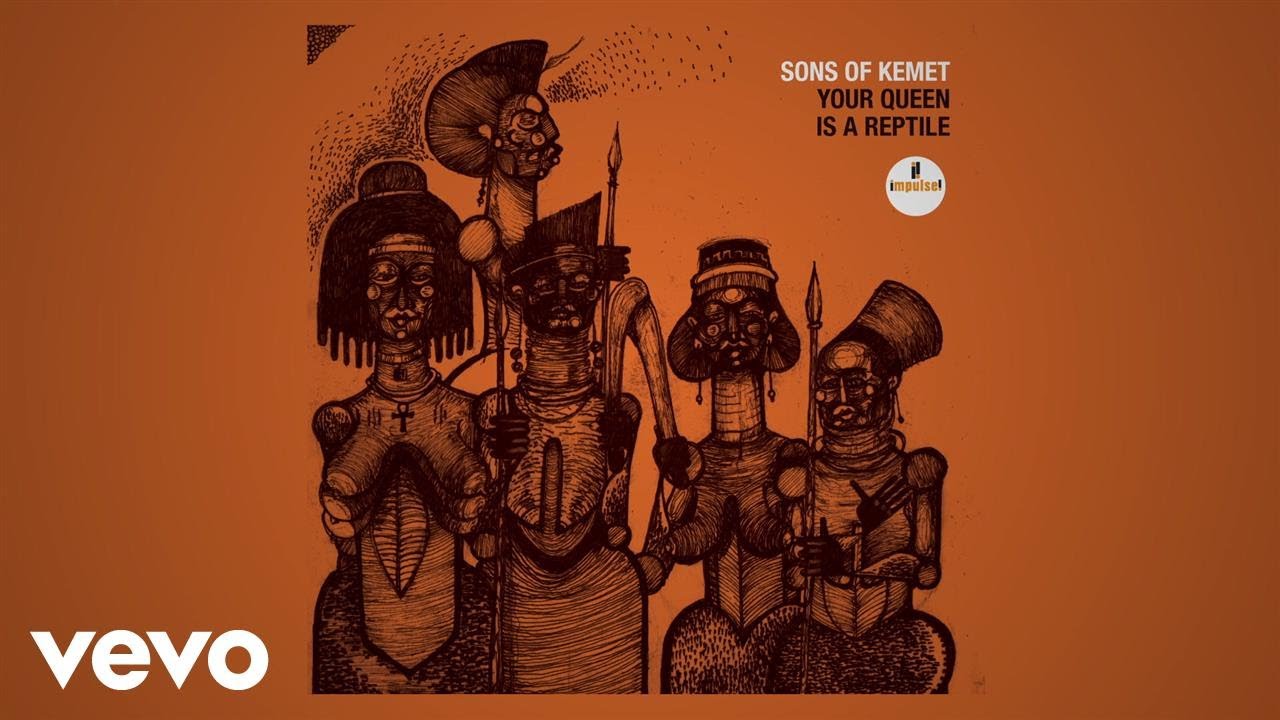Photo by Guidou Pierrick
Your Queen Is A Reptile comes dressed in a trickster’s puffer jacket. It’s the punchline to a joke at the end of a long night, complete with David Icke lizards and references to conspiracy videos in all the eeriest corners of the internet. Opening with ‘My Queen Is Ada Eastman’ – a tribute to bandleader Shabaka Hutchings’ great grandmother – we amble along on Theon Cross’s tuba before being carried away by the dual pacing of Tom Skinner and Eddie Hick on drums. Hutchings enters the fray, a Cheshire Cat grin spilling out of his horn. The rhythm slows, a snake-charmer groove holding you before you realise you’re on a sharp descent into hell – Cross’s master tuba pounding with new intensity all the while. Joshua Idehen’s voice erupts, as though from Hutchings’ horn, unleashing the sonic assault of a lifetime. Of lifetimes. The joke’s not funny anymore, but then again the afterlife of slavery has never been a laughing matter.
Chickens gleefully come home to roost on this album. A triumphant debut on Impulse! for Sons Of Kemet, it’s also a thrilling evolution for a band three albums deep. Each member shows up with new grit, and the unnameable psychedelic future-punk-folk jazz that the band are known for returns tighter, sharper and more voracious than before.
The record achieves the great jazz feat of tuning into the frequency of the present. It offers an interesting challenge for a genre haunted by the easy-to-digest, genteel image of black sorrow. We love the aesthetic sheen of politics in jazz, but we don’t really want to hear it. On this record, we have no choice.
Britain’s first slaving expeditions took place under Queen Elizabeth I, on a ship named after Jesus. The enthusiasm for human bondage and capitalism grew, and saw Britain rise to the global power that it is today. Despite the fact that so much of the modern identity of these isles has to do with conquest, we’ve developed an excellent knack for forgetting, for distancing, for silencing. Over the course of the album, Sons Of Kemet take us on a headlong collision with history, with the original sins of western imperialism. By “rewinding the tape” (to sample from Jack White), Hutchings is “copying God, copying God, copying God”. The past is reordered through the retrieval of suppressed histories, through different queens who have all rebelled in some way against the global legacy of the crown.
An Economist article from 1977 offered that the Queen’s job was to drape a magical ‘golden cloak’ over the mediocrity of her government. 100 years earlier, in the same paper, Walter Bagehot wrote that the English Constitution needed two parts to function: The crown – the dignified – which “preserves the reverence of the population”, and the government – the efficient – which works and rules. If we remove our reverence, where would that leave the monarchy? This album offers a critique of the idea that anyone should be born worth more than anyone else. In the context of the afterlife of slavery, that means a consideration of human value in relation to race and class. We ought to be critical of the monarchy, and of the government passing laws in its name; as black British feminist Gail Lewis recently offered, “Sovereignty is about the capacity to kill.”
Underwriting a critique of power via the exacting lens, experience and names of black women adds a searing edge to the record. As Jamaica Kincaid once mic-dropped, “Do you know why people like me are shy about being capitalists? Well, it’s because we, for as long as we have known you, were capital.” In the same vein, in Mama’s Baby, Papa’s Maybe, Hortense Spillers observed, “I am a marked woman, but not everybody knows my name.” She lists the derogatory “mythical prepossessions” that trap black women: ‘Aunty’, ‘Earth Mother’, ‘Sapphire’, to name a few, all markers of other people’s “investments and privation”. She adds: “My country needs me, and if I were not here, I would have to be invented.” Mythmaking. Liberation for Spillers meant stripping off these layers of meaning “assigned by a particular historical order” in order to meet the “marvels of [her] own inventiveness”.
The crowning of black women on the album is an act of usurpation, a social reordering, a reclamation of souls buried under racist constructs – and for a band of men to produce this shows the expansive potential of feminism. Likewise, it would be remiss to presume that this change of the guard is an offering for black communities alone. The legacy of racism is our collective problem. To heed the words of Combahee River Collective: “If black women were free, it would mean that everyone else would have to be free since our freedom would necessitate the destruction of all the systems of oppression.”
Listening to ‘My Queen Is Ada Eastman’, I’m reminded of artist Robert Pruitt’s crayon drawing ‘Woman With X-Patterned Dress (After Bill Traylor)’. A black woman in a casual day dress with pumps stands with her feet ajar, face proud. She’s worked hard, survived over and over again. Her arms are behind her back, there’s a resoluteness in her stance, and a razor in her hand. This false peacetime pose is symbolic of the low humdrum of resistance in everyday life: the album as a whole is sharply tuned into what Tina Campt refers to as the “sonic frequencies of the quotidian practices of black communities”. Your Queen Is A Reptile reconfigures revolution into a pedestrian affair. In Joshua Idehen’s diatribes – performance poetry at its finest – we hear generations of weariness, defiance and the resolute humour of people going on being in the world in spite of it all. We hear rage as we’re served references to tomato stew, job centre queues and riot. We’re forced to listen to the jarring injustices of immigrant experience, and the loneliness felt by communities who deserve justice – or just lives without racism and discrimination – but come to know better than to expect it.
The record is a sonic meeting place where communities from across time can gather, plan, console. It’s the creek by the woods at midnight, the rave, the church, the political basement. The naming of the tracks offers more than just passive remembrance: it’s deliberate veneration. Each queen represents a different mode of resistance – this is music to move to, in dance and in action.
The cover of Amiri Baraka’s book In Our Terribleness is embossed with a mirror. The book points to the need for black folk, and perhaps everyone else, to look at themselves anew. “Our terribleness is our survival as beautiful beings any where, who can dig that?” he asked. It’s a question that child psychologist Mamie Phipps Clark also considered – her work during the 1940s pushed back against the (still) prevailing myth of whiteness. Her doll test investigated black children’s awareness of race and how much racism they had internalised, and she used her findings to contest segregation laws. ‘My Queen Is Mamie Phipps Clark’ is an ode to self-recovery, to defeating the psychic death inflicted by racism. A celebration, as Baraka wrote, of carrying “a self through all (motives) and motifs the weird world offers”. The ubiquitous figure in Idehen’s wearied refrain – “still here” – from the opening track is coaxed back to life with the “lion, lion, lion warrior” toasting of guest MC Congo Natty.
Hutchings once said in an interview that we should all be engaged in myth-making, and it’s no surprise that this track should come laden with Rastafari-roots sounds. It’s original rebel music come to take down the original myth: Babylon. Cross’s tuba adopts the role of a heavy soundsystem, and we’re inside a sweaty shubeen spilling over with militant, anatomic drum grooves. Hutchings’ horn blares bellicose blues against the MC asserting “me nuh deal with race, me nuh deal with colour, me nuh deal with Babylon”. Choosing to see past race and imagine a world beyond it isn’t a denial of its impact, it’s a refusal to uphold its myths. When sovereignty isn’t about the crown’s capacity to kill, it is about the human right to self-determination.
The story goes that Harriet Tubman – underground code name Moses – sustained a vision-inducing head injury from an overseer. For a day she whispered, “My people are free”, a mantra summoning freedom into the continuum of her present, our present. Whipped by frenzied licks from Moses Boyd and Eddie Hicks, ‘My Queen Is Harriet Tubman’ is a fugitive anthem that belongs to the drummers until the New Orleans big-band-cum-island-fete breaks rip from Cross’s incomparable tuba. To quote Paul Gilroy, it’s the sound of “traffic between African cultural forms and the political cultures of diaspora blacks over a long period’ – the routes and the roots.
Anna Julia Cooper’s journey is staggering – from a plantation to black liberation campaigner, one of the first African American women to obtain a degree, and principal of a high school with radical education practices that took her black students to Ivy League Schools. ‘My Queen Is Anna Julia Cooper’ opens to ultrasound horns dancing around a nimble beat. There’s a quiet air of accelerationism about the track, the flickering montage of a seed pushing its way out of the soil at triple speed. Gilroy’s routes come alive again, but this time on more electronic planes – a slice of house, a shot of techno (held marvellously throughout by Cross). The twin cipher blues of Hutchings and sax-player Pete Wareham, who guests on this track, offer one of the album’s most sublime moments. The indigo synth undercurrents eventually give way to Pharoah Sanders-style screeching and wailing before collapsing into an echo of the central refrain of the record: ‘Still here, still here’.
‘My Queen is Angela Davis’ starts with vigilante cool. Black leather jackets on patrol to a smatter of ‘We Insist!’-style drums as the lo-fi pulse of the tuba adds groundswell momentum. Perhaps an echo of the global protests that followed Davis’ arrest, perhaps capturing the post-68 climate where the world was tilting on its axis towards change. Around the same time, here in Britain, The Mangrove Nine were on trial. Enoch Powell had given his speech, and the immigration laws currently under scrutiny were becoming more austere. The Race Relations Act was, ironically, also passed. Trembling with seismism, the ode to Davis also demonstrates the album’s perfecting of the sound of criticality, the pitch of crisis. The unrelenting tension reminds us that we are never not in a state of emergency, that the stakes are high because they always have been. Drawing from the UK’s archive of underground electronic musics, the track culminates in something that rests between a junglist rave and a drum&bass by-any-means-necessary skank.
In the cool, verdant tones of ‘My Queen Is Nanny Of The Maroons’, we’re granted some reprieve. Drifting to nyabinghi beat, we head back to the 18th century, to the time of Jamaica’s national hero, Nanny Of The Maroons. Known as the ‘obeah woman’, like Harriet Tubman she was a healer, a herbalist. A holder of other ways of knowing – it’s said that her formidable knowledge was a secret weapon against the endless attacks by the British over the course of her lifetime. Nanny created home in the midst of chaos, even as she led missions against the British. It’s an old-time sound – perhaps as a reminder of how long this battle has been.
Next, we head to another site of war, in what is now Ghana. The stealthy pulse that opens ‘My Queen Is Yaa Asantewaa’ is testament to her famed menace. Folklore has it that she used talking drums to warn the British of their imminent beheading. Chamber music melodies from Nubya Garcia and Hutchings percolate around break-drops and regal highlife runs. Yaa Asantewaa’s family were arrested in 1896 when the British sent a memo to the royals demanding control of the Ashante confederacy and the sacred Golden Stool, which she insisted only meant “money to the white man”. Chiding the men who were willing to concede the throne, in an infamous speech she declared: ”If you, the men of Asante, will not go forward, then we will. I shall call upon my fellow women. We will fight the white men. We will fight till the last of us falls on the battlefield.” She waged war until her capture and exile to the Seychelles.
‘My Queen Is Albertina Sisulu’ launches in the key of grime, with MC-like jabs on the sax and tuba. Both edge into tuk-style percussion with a dynamic Hutchings has mastered – an incessant digging into the space between grooves, a wedging of systemic cracks. Sisulu was a nurse and activist, the ‘Mother of the Nation’ of South Africa. Her earliest forms of activism were – like so many black woman globally – rooted in community work, in overcoming the inequality-by-design that colonialism leaves behind as its living legacy. One of the first banning orders she received was for attending a multiracial reception at the British consulate. As the blasts on the sax quicken, the music takes a turn into soca. The drums rumble on, night descends with thousands of feet chippin’ in honour of ancestors. Moko jumbies and masquerades fly across the sky. Frenzied blasts from tuba and sax scream “crop over, crop over!” as we hurtle through Foreday morning, rushing towards dawn, towards carnival. It’s celebrating the end of one form of bondage while deftly resisting the emergent new face of oppression through the thick squalls streaming out of Hutchings’ saxophone.
And so it is that we arrive at the final track. We’ve travelled across sprawling cartographies of struggle and rebellion, and we’re suspended in the limbo of recent history.
Cross’s oscillating drone signals the beginning of ‘My Queen Is Doreen Lawrence’. It reverbs with rage, with history repeating itself. Hutchings’ horn plays like an alarm that won’t stop sounding. It’s a destabilising sound. Stephen Lawrence died 25 years ago, his name becoming a signifier for the manifold injustices surrounding race relations in the UK. Doreen Lawrence’s relentless campaigning has seen her speak out about housing, education, and employment. Idehen’s memorable lines “Don’t wanna take my country back mate, I wanna take my country forward”, echo the words of Lawrence in a 2012 interview. Noting the inequality in Britain she said: “We’re at a standstill, we are going backwards.” When Idehen exhorts, “to want to know you’re in safe hands”, he could be speaking for Sarah Reed, for the communities surrounding Ladbroke Grove, for Olaseni Lewis.
This album is epic in its scale. To paraphrase Idehen’s line, it’s the clap back to centuries of racist clap trap. Musically, it holds the complex convivial ground – of musical traditions from across the world, and their histories – while somehow sounding like a tomorrow as yet unrealised.
The band are both vigil keepers for the doorway of no return and custodians for the door of the cosmos – which isn’t some far flung outer space place, it’s here, now, in a continuum where the past, present and future all coexist in the same rhythmic slipstream. In the same way that revolution becomes pedestrian, afrofuturism becomes mundane on this album. The future we’re reaching for rests outside of that space, while remaining fully aware of all that has come before. Your Queen Is A Reptile offers a sonic accompaniment to the “electric feeling that Mundane Afrofuturism is the ultimate laboratory for worldbuilding outside of [racism] imperialism, capitalism… and patriarchy.” It offers a blueprint for the pragmatic work of reparations – or reparare, Latin for ‘to make whole again, to repair’. It argues that we are not aliens, while legitimately calling the queen a reptile. Why?
Because Your Queen Is A Reptile is code for: something is deeply broken. It’s code for: we need longer memories. It’s a talisman for refusal. Say it, and you might just see the world and your place in it differently. It’s code for: we need new myths, and we have the power to make the world over again ourselves.




